People considering a culinary degree or diploma are often asked: “Why bother going to culinary school? Can’t you just learn on the job?”
And it’s true! Just like an actor doesn’t have to take acting classes, and a writer doesn’t have to study journalism to achieve success, a career in the food industry doesn’t require a formal culinary education.
But by focusing on education for a few months or years, students can reap a host of benefits that the “work your way up” approach doesn’t offer. Plus, completing a culinary program may help graduates to achieve their goals more quickly.
Here we’ll explore the value of culinary degrees or diplomas, and why many students have found that culinary school is absolutely worth it.
The Culinary School Experience Can’t Be Replicated on the Job
Some say that culinary school is unnecessary because cooks can learn “on the job.” And while there are certain lessons that are best taught in a professional kitchen—like how to work around other team members on a crowded line, or how to manage your time during the dinner rush—there are unique benefits to the classroom setting that simply can’t be replicated in a working kitchen.
Here are some advantages students may encounter when taking the culinary school route.
Restaurants Are Devoted to Service, but Schools Are Devoted to Learning
In a professional kitchen, your job as a cook is to get those potatoes peeled and that hollandaise prepped for service. And the executive chef’s job is to get the food out the door to serve hungry customers. Keeping the restaurant profitable is the end goal.
As long as you can complete the tasks assigned to you, your supervisors may not have the time or incentive to help you expand your culinary skills. And even if you’ve found a great chef mentor, you’ll still have to complete your assigned tasks before you can focus on learning.
A culinary student’s job, on the other hand, is to learn as much as possible. And your Chef Instructor’s job is to teach you. Everyone is working toward the same goal—providing students with the knowledge and tools they may need to be successful in their careers.
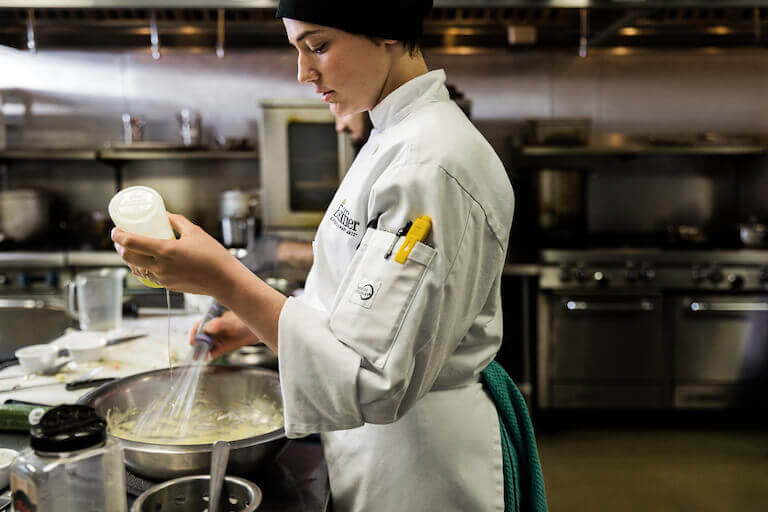
This environment encourages students to ask questions, make mistakes, and practice until perfect, without holding up service or wasting a restaurant’s product. Trying new techniques is what school is all about!
Culinary School Explores Why, Not Just How
If you want to be creative in the kitchen, you need to understand why certain techniques give you the desired result.
Why do savory dishes benefit from a hint of acidity? Why do we add eggs to a cake? Without an appreciation for these foundational culinary principles, you may find yourself unable to make substitutions and alterations, hindering your creativity in the future.
In culinary school, Chef Instructors are available to explain the science behind ingredients and techniques, which may then become tools in your experimental toolbox.
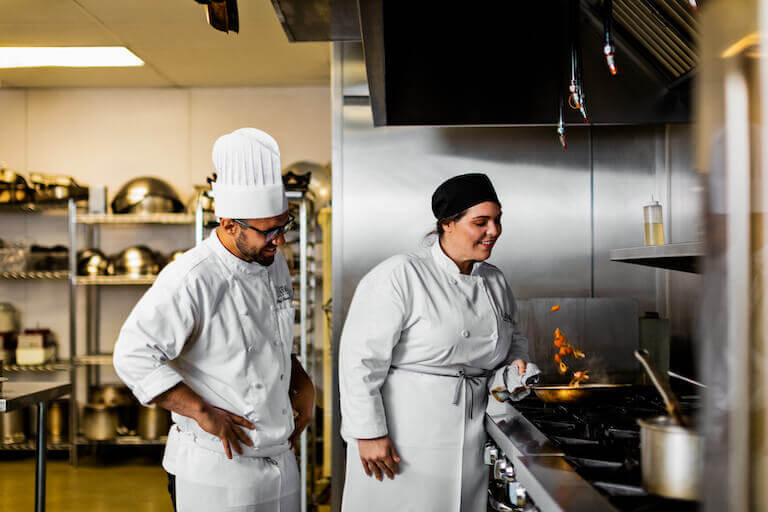
Culinary Students May Be Exposed to Worldwide Cuisines
A major drawback of the “learn on the job” method is the limited scope of techniques available to you.
A restaurant or professional kitchen makes a certain number of predetermined menu items, often within one specific type of cuisine. Cooks are responsible for executing these same recipes over and over. And while they may gain great mastery of that one culinary style or those particular dishes, they won’t necessarily have the opportunity to explore different world cuisines.
But in culinary school, students may have the opportunity to explore a much wider variety of food styles. Escoffier’s Culinary Arts programs may include courses on global or regional cuisines, exposing students to culinary traditions from around the world.
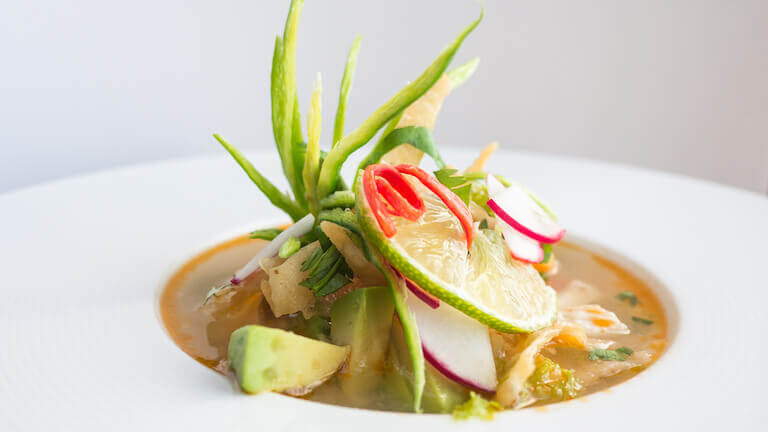
Culinary Students Study with a Team of Chef Instructors
Not all chefs approach each technique in the same way. When learning on the job, you are only taught one chef’s method. And in a restaurant, this makes sense! The executive chef relies on the entire team to do things their way to create a consistent guest experience. But from a learning perspective, it can be confining and potentially hinder your growth as a chef in your own right.
The kitchen environment is limited in its number of possible mentors and educators. In culinary school, on the other hand, students have the opportunity to receive instruction from a variety of successful, passionate Chef Instructors who have worked in many types of roles and establishments. The quality and diversity of educators alone can make culinary school worth it!
“You have mentors in a restaurant setting, but you won’t get the variety. At Escoffier, you’re exposed to 10+ executive chefs, and you’re surrounded by them every day. There’s a wealth of mentorship at your fingertips.”*
Shane Witters-Hicks, Escoffier Boulder Graduate & Plant-Based Private Chef
Coursework in Sustainability Can Make Future Chefs Protectors of the Environment
Some culinary degree and diploma programs even can get students out of the kitchen and onto the farm! Escoffier’s Farm to Table® Experience lets Culinary Arts students explore farming, production, and the advantages of buying local.
On-campus students spend one day per week on a working farm or food procurement facility. Depending on the farm’s needs, they may get an informational tour, or they may be able to dig in and get their hands dirty (literally). Online students have the chance to study the relationship between the chef and the food producer. While not part of the curriculum, students may get the chance to attend in-person weekend workshops, depending on location and availability.
The future of the culinary industry must also be a future of sustainability. Chefs have a wonderful opportunity to be part of a more harmonious relationship between the food industry, the farming industry, and the consumer. But first, chefs must begin to understand where the food they use comes from and how it impacts the wider world.
The Essential Culinary Career Survey
The Essential Culinary Career Survey
What's your ideal culinary career: Fine dining? Your own restaurant? Pastry? Get our self-evaluation survey to find out!
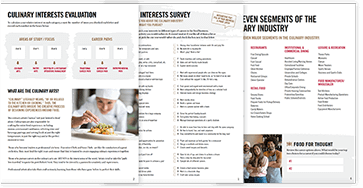
We’ve compiled a checklist of all of the essential questions into one handy guide: career options, culinary interest surveys, educational opportunities, and more.
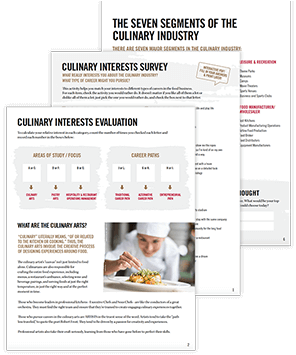

An Investment in Your Education May Improve Your Employment Prospects
Culinary school graduates are not chefs (yet). That’s a title they still must earn.
But a culinary degree or diploma on your resume may provide hiring chefs or supervisors with proof that you take your career seriously. And that could be the difference between being granted an interview or being passed over for a more experienced candidate.
How Much Does Online Culinary School Cost?
Diploma in Culinary Arts and Operations – $19,495*
Associate of Occupational Studies Degree in Culinary Arts – $29,725*
Scholarships, grants, and financial aid are available for eligible students who apply and qualify. Get more information about tuition and fees for all Escoffier programs here.
*As of April 2022
Culinary Graduates Differentiate Themselves from the Crowd
In any career, there are skills to learn on the job as you work your way up from entry-level to advanced positions. Hiring chefs expect that new cooks may have a lot to learn. That means that they may need training – which takes a hiring chef’s time, effort, and resources.
So put yourself in their shoes. You see two resumes with identical work experience. Each candidate has held one position in a professional kitchen as a prep cook. But one went to culinary school, and the other didn’t. Which candidate looks more appealing?
The culinary school graduate can bring a level of technical skill to their job that the other applicant might not be able to match – skill that’s been built through education in theory and then plenty of supervised practice. And that can often help make the training process go more smoothly, more quickly, and potentially with less of the hiring chef’s intervention needed.
“I think that students who go to culinary school have an advantage over those who don’t. I know in my career, the students or the cooks I’ve hired who went to culinary school, I didn’t have to teach them how to Brunoise cut a carrot. They knew how to do it.”*
Chef John Hummel, Culinary Arts Chef Instructor at Escoffier’s Austin Campus
Chefs are busy people, so the greater baseline knowledge a candidate brings to the table, the better!
Investing in Culinary School Shows Your Dedication to This Career
For some, working in a restaurant is just a job, rather than a career. That’s why the industry as a whole has such high turnover—nearly 75% in 2018 (pre-pandemic).
Turnover is time-consuming and expensive. It can cost thousands to hire and train a new cook or chef. So executive chefs are looking for employees who will be in it for the long haul.
Culinary school graduates can appear as safer long-term hires. By earning their culinary degree or diploma, graduates prove that they have invested their own time and money into the profession and the development of their skillset. It shows that the candidate sees a kitchen as more than just a place to work for a few months.
“If someone told me to skip culinary school and just try to work my way up, I would think they didn’t have my best interests at heart. Sure, you can work your way up from a line cook to a head chef, but you’re going to need a degree to hold any management position in today’s age. It would be more than worth your investment to go to culinary school as opposed to just working through the industry.”*
Kate Sardo, Escoffier Boulder Culinary Arts Graduate
Culinary School Graduates May Be Better Equipped to Keep Up in the Kitchen
Professional kitchens can be fast-paced and dangerous, with hot pans and sharp knives around every corner. This can be a disorienting environment for entry-level staff with no kitchen experience. But if you’ve attended culinary school, you may be more familiar with both the environment and terminology of the kitchen.
Escoffier graduates also enjoy the benefit of their industry externships. All degree and diploma programs require students to complete a hands-on externship in a professional setting. This can give them the chance to test their skills, make new connections, and get their first experience of the chef’s world! They can enter their first post-school job with real kitchen time under their belts, helping them to get acclimated to the work environment that much more quickly.
Chef Omni Hotels & Resorts Executive Chef John Hasho explaining why culinary school is a gold star on your resume*
A Culinary Education Bridges the Knowledge Gap
Not everyone who attends culinary school has the goal of working in a kitchen. An aspiring food writer with a journalism degree, for example, may be a wonderful wordsmith. But if they don’t have an intimate knowledge of food to back up their writing, it may be difficult for them to find work in the industry or produce expert content. This is the value of specialized education. It can bridge the gap between your technical skills and the subject you want to work with—food.
“Because of my experience at Escoffier, I feel like I can work a lot better with chefs… because I understand the mind of a chef, and I get what they’re doing. And I think they have a little more respect for me when they know that I know where they’re coming from. Escoffier really helped with understanding all the steps that go into a final product.”* Rhonda Adkins, Escoffier Online Graduate and Food Photographer
Food stylists, restaurant publicists, food photographers, restaurant owners, recipe developers, and more can all show their industry authority with a culinary or pastry degree or diploma.
Culinary School Can Allow Students to Start Building a Professional Network
A robust network of cooks and chefs can prove invaluable during a culinary career. When a chef has a position to fill, what is the first thing they’ll do? They’ll think about their network and who they know who could fill the position. Then, they’ll reach out to their industry connections to see if they know a good candidate.
Some chefs won’t ever post jobs on local job boards. They’ll fill openings by word-of-mouth alone. That’s why a network is so important—it may open the door for positions and opportunities that you might not hear of otherwise.
Connect with Fellow Students Today and Help Each Other Tomorrow
The successful executive chefs of tomorrow are often the culinary school students of today. School can give you the chance to bond with fellow students who are also passionate about food and cooking.
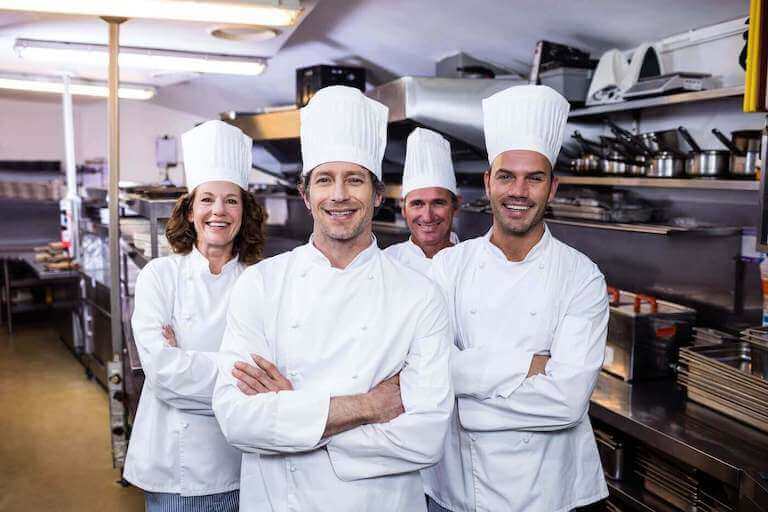
At Escoffier, the networking opportunities don’t necessarily end when you get your degree or diploma. Graduates can get access to the Escoffier Alumni Association, an online community where they may connect with other former students, access job postings, and gather with like-minded graduates in specialized groups.
“Just talk to everybody,” says Escoffier Chef Instructor Emily Maddy. “Don’t put any sort of guard up. Everyone’s different. Just keep it professional and talk about food.”* If anyone knows the value of a professional network, it’s Emily. She first learned about the opportunity to become an Escoffier Chef Instructor through a friend and former co-worker!
Find Mentorship Among Experienced Chef Instructors
Escoffier’s Chef Instructors are invested in the success of their students. With many years in the industry and a wealth of knowledge to share, these experts can be invaluable resources to culinary school students.
Some students even establish long-term mentorships with Chef Instructors. And this might give them the chance to reach out throughout their careers for tips and advice. Austin campus Chef Instructor John Hummel often shares his contact information with his students so he can answer questions even after they’ve graduated. He tells them, “If I can do anything for you going forward, do not hesitate. Job recommendations, advice—do not hesitate. And several have taken me up on that.”*
Meet Successful Chefs and Volunteer with Industry Professionals
Culinary school also can provide networking opportunities outside the four walls of the classroom.
Students at Escoffier’s Austin or Boulder campuses may have the chance to participate in food festivals or culinary competitions as student volunteers. This can give them the opportunity to work elbow-to-elbow with great local chefs.
Baking & Pastry Arts student Katie Sualog gushes about her opportunity to volunteer at the Austin Food & Wine Festival. “I honestly felt honored to be there,” she says, “because I got to meet so many well known chefs and they were very, very humble. I was blessed to meet them. Rodney Scott, oh my god! I was so excited.”
And all graduates must complete their industry externships, where they can connect with a whole kitchen of working culinary professionals. Online students complete externships, making it a convenient way to meet cooks and chefs. They may also be able to connect with local food events in their areas.
Culinary Graduates Can Look Forward to Post-School Support
Most cooks and chefs are on their own when looking for career opportunities. But Escoffier graduates can get even more value out of their culinary education with job search assistance.
Our Career Services staff offers resume writing help, interview coaching, and job leads for students based on their career goals. Escoffier also works with employer partners like Disney, Hyatt Hotels, and The Ritz-Carlton, which may lead to job search opportunities for graduates.
“Escoffier is not only about the school. It’s about the depth of the connections you’re going to have for life. The committees that you can be part of. The alumni association. The student services staff who may help you get jobs. The connections and established resources that you get from Escoffier is worth every dollar of it.”*
Amber Gardiner, Escoffier Boulder Culinary Arts Graduate
How Committed Are You?
A culinary diploma or degree can do more than provide cooking knowledge. It can show that you’re serious about a career in Culinary Arts, Plant-Based Culinary Arts, or Pastry Arts. It can tell hiring chefs that you’re willing to prioritize your culinary future— because you’ve already invested in your education. And it can allow you to start building a network that may lead to employment opportunities in the future. That network could also be a source of future employees if you become an executive chef yourself!
If you’re ready to continue your commitment to your culinary career, it’s time to get all the details about Escoffier’s degree and diploma programs.
Did you find this article helpful? Here are a few more you might like:
- 3 Ways Culinary School Can Boost Your Career
- Who Hires Online Culinary School Graduates?
- What Every High School Student Should Know About Culinary School
This article was originally published on August 17, 2020, and has since been updated.
*Information may not reflect every student’s experience. Results and outcomes may be based on several factors, such as geographical region or previous experience.

 “You have mentors in a restaurant setting, but you won’t get the variety. At Escoffier, you’re exposed to 10+ executive chefs, and you’re surrounded by them every day. There’s a wealth of mentorship at your fingertips.”*
“You have mentors in a restaurant setting, but you won’t get the variety. At Escoffier, you’re exposed to 10+ executive chefs, and you’re surrounded by them every day. There’s a wealth of mentorship at your fingertips.”*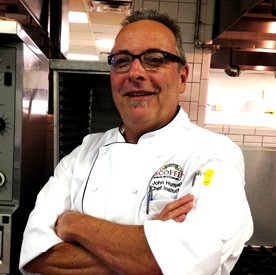 “I think that students who go to culinary school have an advantage over those who don’t. I know in my career, the students or the cooks I’ve hired who went to culinary school, I didn’t have to teach them how to Brunoise cut a carrot. They knew how to do it.”*
“I think that students who go to culinary school have an advantage over those who don’t. I know in my career, the students or the cooks I’ve hired who went to culinary school, I didn’t have to teach them how to Brunoise cut a carrot. They knew how to do it.”* “Because of my experience at Escoffier, I feel like I can work a lot better with chefs… because I understand the mind of a chef, and I get what they’re doing. And I think they have a little more respect for me when they know that I know where they’re coming from. Escoffier really helped with understanding all the steps that go into a final product.”* Rhonda Adkins, Escoffier Online Graduate and Food Photographer
“Because of my experience at Escoffier, I feel like I can work a lot better with chefs… because I understand the mind of a chef, and I get what they’re doing. And I think they have a little more respect for me when they know that I know where they’re coming from. Escoffier really helped with understanding all the steps that go into a final product.”* Rhonda Adkins, Escoffier Online Graduate and Food Photographer “Escoffier is not only about the school. It’s about the depth of the connections you’re going to have for life. The committees that you can be part of. The alumni association. The student services staff who may help you get jobs. The connections and established resources that you get from Escoffier is worth every dollar of it.”*
“Escoffier is not only about the school. It’s about the depth of the connections you’re going to have for life. The committees that you can be part of. The alumni association. The student services staff who may help you get jobs. The connections and established resources that you get from Escoffier is worth every dollar of it.”*

